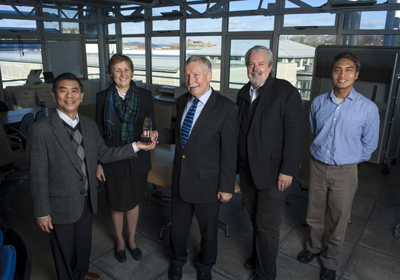Press Release: Carnegie Mellon School of Architecture Team Wins NSF Prize For Technological Innovation and Positive Impact to Society
Contacts: Pam Wigley / 412-268-1047 / pwigley@andrew.cmu.edu
 PITTSBURGH-Carnegie Mellon University School of Architecture's Center for Building Performance and Diagnostics (CBPD) team has received the National Science Foundation's (NSF) 2013 Alexander Schwarzkopf Prize for Technological Innovation for its "exemplary research contribution to technology innovation and its positive impact on technology, industry and to the society as a whole." The CBPD was selected by the Industry/University Cooperative Research Center (I/UCRC) Association Committee.
PITTSBURGH-Carnegie Mellon University School of Architecture's Center for Building Performance and Diagnostics (CBPD) team has received the National Science Foundation's (NSF) 2013 Alexander Schwarzkopf Prize for Technological Innovation for its "exemplary research contribution to technology innovation and its positive impact on technology, industry and to the society as a whole." The CBPD was selected by the Industry/University Cooperative Research Center (I/UCRC) Association Committee.
Volker Hartkopf, director of the CBPD, accepted the prize at the Annual Directors Meeting of the NSF I/UCRC on Jan. 9 in Arlington, Va. Other team members honored for their contributions are: Professor David Archer; Senior Researcher Azizan Aziz; Professor Khee Poh Lam; Professor and Head of the School of Architecture Stephen Lee; and University Professor Vivian Loftness.
The Alexander Schwarzkopf Prize is awarded annually in honor of the I/UCRC founder (1979), longtime manager and current honorary leader. Now directed by Rathindra DasGupta, the I/UCRC provides opportunities to partner with other leading institutions to conduct industrially relevant research, receive seed funding and recognition as an NSF research center with access to professional resources and enhance global competitiveness. The prize to Carnegie Mellon is especially significant, Loftness said, because the NSF has not traditionally recognized building science.
"Now, however, building science is gaining in awareness among engineers, scientists and federal agencies, primarily because of concerns relating to energy consumption and the world's focus on reducing our carbon footprint," she said.
In 1990, the CBPD was the first I/UCRC recognized by the NSF that was focused on the building industry. The second I/UCRC in the building industry was established with the assistance of CMU's CBPD at the University of California, Berkeley. Now, the CBPD is a partner with the University of North Carolina-Charlotte and the City College of New York within the City University of New York (CUNY). The CBPD works closely with the Advanced Building Systems Integration Consortium (ABSIC), a university-industry-government partnership founded in 1987 that pursues research, demonstration and development toward improving the quality and performance of commercial buildings and building systems.
Working with ABSIC partners, Carnegie Mellon's CBPD built the Robert L. Preger Intelligent Workplace (IW) in 1997. The IW is the first living (continuously improved and updated) and lived-in (experienced, measured, reported and verified performance) laboratory focused on energy, the environment, economics, human health, organizational productivity and best building systems integration practices. The IW - focused on what the CBPD teaches, researches, develops and demonstrates - resulted in the center's team members consulting on major breakthrough products in the United States, Canada, China, Germany, Korea, Singapore and Taiwan.
The NSF funds research and education in science and engineering through grants, contracts and cooperative agreements. More information on the I/UCRC is available at http://www.nsf.gov/eng/iucrc/.
Resources: Details about and interviews with Professor Hartkopf regarding the IW are available at http://www.cmu.edu/homepage/innovation/2007/spring/intelligent-workplace.shtml; http://www.pbs.org/newshour/bb/environment/july-dec08/energytech_07-07.html (article); and http://www.pbs.org/newshour/video/module.html?mod=0&pkg=7072008&seg=3 (video).
###
Pictured above are Khee Poh Lam, Vivian Loftness, Volker Hartkopf, Stephen Lee and Azizan Aziz.